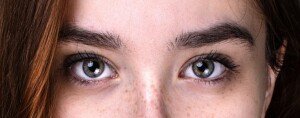
Not all autistic people hate looking into someone’s eyes. Eye contact is crucial for me, but as an emitter of information rather than as a receiver.
I have a clinical diagnosis of Autism Spectrum Disorder, received in spring of 2022.
My autism was completely missed in childhood because back then, this neurotype was thought to exist primarily in boys — and in a more severe and disabling presentation.
I never had a problem making eye contact with my parents whenever we had conversations.
I have no recollection of siblings, teachers or classmates reporting that I averted their gaze.
But as we get older, eye contact becomes more relevant. People use it more, and people expect it more.
We are put in positions in which we must be silent for extended periods while listening to explanations, instructions or stories – told by someone who’s directly facing us one-on-one.
And in the adult world, we find ourselves often needing to approach strangers for some kind of assistance (retail clerks, bank tellers, medical staff, service techs, servers, furniture delivery personnel, etc.).
Why I Make Eye Contact Despite Autism
It’s not to make the other person comfortable. Instead, it’s all about ME, how I want to come across to that individual.
An exception would be if I’m listening to a close family member and want them to know that I’m interested or showing respect.
In no particular order, here’s why I make eye contact:
#1 To Assert Authority or Show Disdain
For example, alerting a neighbor that their dog barks all day. People will look at my eyes. I use them to convey information.
Neurotypicals feel a great need to look into a pair of eyes. Hence, I use my eyes to deliver information to them — along with my words, tone of voice and body language.
A person won’t take me seriously or be moved as much to mitigate a problem if I’m looking down or otherwise away from their eyes.
If I avoided eye contact when telling a neighbor I could hear their thumping music through my walls, it’d make them think I was skittish – and they’d then think they could continue getting away with the infraction.
One time a neighbor opened her door to my knock; my eyes were smack on hers as I started talking: “Can you…”
She knew right away why I was there and interjected with, “Oh, it’s the music, I’ll lower it, I’m sorry.”
I’m convinced my eye contact played into my overall presentation.
Eye contact asserts my “authority” or unwillingness to tolerate a problem, letting them know I mean business.
Eye contact lets service people know that:
- I expect excellent service.
- I’m not wishy-washy or indecisive.
- Providers won’t get away with shoddy service.
- I know what I want and expect upfront communication.
If I’m passing a man at night on an obscure sidewalk, he’ll get my eye contact – briefly, to let him know I’m alert and aware and know what he looks like, and that I’m not fearful or submissive-looking.
I’ve studied martial arts at several schools, and every instructor emphasized the importance of eye contact when confronted with a perceived threat.
Eye contact tells a predator that you’re ready to defend yourself.
#2 To Be Convincing
If I want to have any chance of winning an argument, eye contact is crucial. This doesn’t mean I hold it nonstop without any break.
Breaks will come naturally if I’m moving around, especially if I’m standing and very especially if I’m moving my arms and hands.
But the recipient will definitely know what direct eye contact with me looks like. I will maintain it much more while they’re the one speaking.
When it’s my turn to explain, I often have to break it within 10 seconds to maintain my focus, holding my gaze off to the side somewhere as I’m still talking. I then remind myself to return my gaze to their eyes.
This requires conscious effort. I must make sure I’m not staring off to the side for too long.
In briefer back-and-forth verbal interactions, I hold eye contact pretty consistently. If I break it, that’s because it starts becoming a mild distraction.
#3 To Show My Interest
If someone’s answering my question, I’m going to hold eye contact. I want them to know I’m interested.
If I avoid it, they may cease talking or water down their answer, figuring I’m getting bored or losing interest.
When I’m the listener I tend to lock onto the speaker’s left eye.
This has a mechanical feel rather than instinctive – yet is easy for me to sustain, though it also feels like I’m staring — especially if the recipient has “hard” eyes or I sense a disconnect with him or her.
But I can’t look away. The idea of looking away makes me think the speaker will stop or assume I’m not serious about the matter at hand.
This long eye contact feels like a formality, and maybe it’s also partially driven by societal expectations.
#4 To Show Politeness or Respect
So here is a circumstance in which the eye contact is to make the other person feel comfortable.
This will either be a close family member or someone in the business world whose business I desperately need at a top-notch level.
#5 To Catch Someone’s Attention
During the mask mandates at the gym, I’d notice men with their mask only over their mouth.
This angered me. I wore a mask that said, “The Mask Goes Over the Nose.”
So I’d be watching their eyes, hoping they’d make eye contact. When they did, I’d point to my mask, hoping they’d notice its message. Or, I’d signal with my hands for them to pull up their mask.
This approach actually worked for some of these men. It really steamed me how many men wore their mask only over their mouth, and occasionally I’d see one with NO mask — despite a legal mandate. Some women were guilty of this nonsense as well.
I’d often think, “It’s a new rule — wearing a mask — why can’t people just follow the rules?!”
If I need assistance from a retail worker at Walmart or want to get a restaurant server’s attention, I’m going to try to catch their eyes.
It’s not appropriate to yell across the diner, “Hey Miss! Come Here!”
Does this mean that in every single case of brief human interaction, I lock my eyes onto theirs? No, not at all.
Not long after my ASD diagnosis, a cashier rung up a sale for me. Right away I suspected she was autistic (her intense eye contact, flat facial expression and a peculiar speech pattern).
I met her eyes briefly here and there, but at the end, when she put the sales slip in the bag and handed it to me, I kept my eyes on the bag and thanked her.
There was no need to give her another brief bout of eye contact, especially since I sensed she was uncomfortable just being there.
I give brief eye contact only when it can enhance the situation, or, to put another way, if avoidance might sour the situation.
Plus, sometimes it just naturally happens; in brief interactions it sometimes feels instinctive, though in other interactions, it feels like a formality.
#6 To Avoid Appearing Easily Victimized
This ties into the first reason. Gaze aversion comes across as a sign of nervousness, unsureness, of easily being harassed or bullied, of easily being taken advantage of, etc.
I don’t want to look like prey, and believe me, there are a LOT of predators out there – and I don’t mean just sexual assault. A predator could also be a scammer in the business world.
If the interaction is short and sweet, I may not give eye contact.
If someone, who’s exiting an elevator, holds the door for me as I enter, I’ll thank them but often won’t give eye contact. It would serve no purpose.
It’s a fleeting moment, a snapshot in time; eye contact is not necessary, and quite frankly, I don’t want it under this circumstance.
- But if that man steps into the elevator with me, this changes the dynamics.
- I will briefly and confidently meet his eyes before the doors close on us.
Eye Contact to Communicate My Emotions
It’s very rare that I rely on looking at someone’s eyes to figure out their feelings.
Instead, I rely heavily on their words, how they’re talking and tone of voice, and their overall facial expression.
At an autism event, I met a man in his 50s who’d been diagnosed autistic a few years prior.
What had led to his diagnosis was his son getting diagnosed several years before.
Jeff’s eye contact wih me appeared perfectly normal. I asked if he’d ever had any issues with eye contact. He said none whatsoever. Here is Jeff’s account of his eye contact.









































